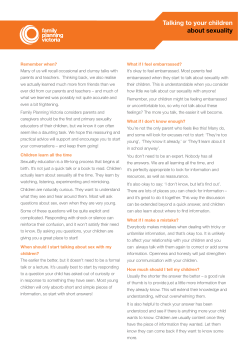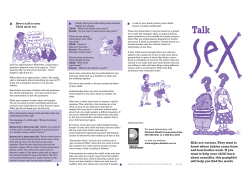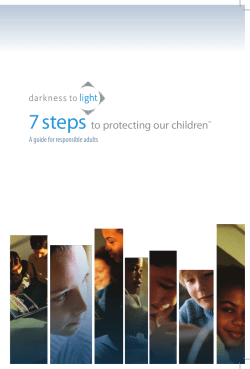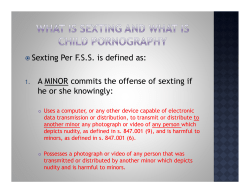
Kalamazoo College ANSO 225 – Winter 2011 SEX & SEXUALITIES Course Syllabus
Kalamazoo College ANSO 225 – Winter 2011 SEX & SEXUALITIES Course Syllabus Prof. Adriana Garriga-López Anthropology and Sociology, Dewing 309 – G Tel. 269-337-7363 Email: Adriana.Garriga-Lopez@kzoo.edu Office Hours: Tuesdays 2:30 – 4:00 pm, Wednesdays 12:30 – 2:00 pm, and by appointment. Course Description: This course provides students with an overview of influential theories about the social aspects of sex and sexuality, as well as some direct engagement with ethnographic representations of sexual worlds and their politics. It examines the diversity of human sexual identities and activities in their historical, philosophical, legal, and social contexts. This course will consider sex and sexualities in an intersectional way, that is, in and through their intersections with issues of race, class, gender, nationality, and globality. The course will proceed from the analysis of sex as a fulcrum of social relations in a wide range of cultural contexts. We will explore questions such as: What is or what counts as sex?; What kinds of sexual activities are considered acceptable and who gets to engage in them?; What is the relationship between state power and sexuality? ; What contributions have feminism and the LesbianGay-Bisexual-Transgender-Intersexed/Queer Liberation movements made to the study and general understanding of human sexuality and how have they transformed the political context of and debates about sexuality?; and How do these dynamics differ across social contexts and in different historical moments? Course Objectives: By the end of the course: Students will be able to discuss the diversity of human sexual behaviors and identities in social contexts both similar and different from their own in an informed manner Students will be able to identify and analyze (using relevant literature) the social construction of sexualities and sexual identities. Students will become familiarized with the history of the scholarly investigation of sex and sexualities and be able to discuss the evolution of ideas about human sexuality in social context. Students will be able to discuss and analyze the relations of power that shape and constitute spheres of sexual activity and identification. Students will be able to analyze the formation of sexual subjects in cultural context and discuss the main currents of debate and political struggle around sexual rights and sexual expression. 1 Course Policies: Laptop computers will not be permitted in class, except for use in presenting images or information to the class as a whole. You must take notes by hand, unless you have a specific need for computer use in the classroom, in which case you must communicate this to your professor at the beginning of the quarter. Office Hours – Students, especially first-year students, are encouraged to make use of office hours to discuss or clarify aspects of course materials or discussion. Talking to your professor during office hours is a good way to make sure that you understand the ideas and texts discussed in class. Students are also encouraged to discuss with one another outside of class, or to create study groups to assist in the analysis of texts so that discussion in class proceeds smoothly. Sexual Autobiography – Students will be asked to write, draw, paint, perform, or otherwise produce a creative, textual, audio, photographic, video or other representation that accounts for their own development as a sexual subject. Students may interpret this prompt as widely as desired, within the confines of the college’s regulations and norms of appropriate behavior. This assignment will be worth 5% of a student’s grade and will be assessed on the basis of creativity of the presentation, depth of introspection, critical reflection, and sustained analysis of the socio-political relevance of their own subjective experience as sexual/ized subjects. Attendance and Participation – Students are expected to attend all course meetings and to read all assigned materials for the course. During course discussion, students will be expected to participate regularly in class and to ask questions. Remember there is no stupid question but the one that remains unasked. Your professor will encourage questions and requests for clarification in the classroom during specific periods of time, typically at the start or near the end of class meetings. An A grade is assigned to a student who participates at every class meeting, and who incites dialogue and discussion through pertinent and thought-provoking questions. A B grade is assigned to a student who participates every day or nearly every day, demonstrating comprehension, but whose comments don’t produce significant discussion. A C grade is given to a student who participates only sometimes and whose comments show confusion, insufficient reading, or incomprehension. A D grade is assigned to a student who participates rarely and demonstrates a lack of engagement in the classroom and an F grade is given to a student who never participates and does not ask any questions. All absences must be explained to the professor and any student who has more than three unexcused absences will automatically receive a grade of zero or fail on their attendance and participation grade. Any and all medical absences must be excused by a note from your health provider, without disclosing private health information and in accordance with HIPAA legislation. Attendance and participation in class will count 20% towards your final grade. Response Papers – Students will turn in three response papers of no less than two and no more than three pages length (2-3.) Response papers will be typed in 11 pt. font size, Times New Roman font, and double spaced. Late papers will not be accepted, except by previous arrangement with the professor and then only due to extenuating circumstances. Papers will be graded and returned a week after students have turned them in to allow for appropriate feedback. A response paper is a brief essay 2 where students elaborate on a quote or series of quotes, a theme or motif, or an aspect of the historical background or social context of the texts discussed that is of particular interest to the student. Student response papers will be assessed on four evaluative registers; 1) the clarity of the writing, 2) demonstration of familiarity with course materials, 3) the complexity of the ideas and questions presented, and 4) the exposition of clear arguments with appropriately referenced evidence and citations. Final Take Home Exam – The final exam will be distributed a week before the due date. Students will have a week to complete the exam. Late exams will not be accepted, except as by previous arrangement and then only due to extenuating circumstances. The exam will be composed of one or more essay questions. The questions will ask students to reflect on the assigned texts and class discussions and to demonstrate command of central concepts and the ability to produce nuanced analyses of particular issues pertaining to the study and analysis of sex and sexualities. Final exam essays will be no shorter than eight and no longer than ten pages in length and will be typed, in 11 pt. font size, Times New Roman font, and double spaced. Final exam essays will be assessed on four evaluative registers; 1) the clarity of the writing, 2) demonstration of familiarity with course materials, 3) the complexity of the ideas and questions presented, and 4) the exposition of clear arguments with appropriately referenced evidence and citations. Moodle and Online Resources – Some course materials will be available through Moodle on the class website. Your professor may use Moodle to distribute important information, as well as relevant internet content. You may also use Moodle to stimulate and carry out discussion among your peers. You are encouraged to check the site frequently. Citations and Plagiarism – Students will adhere to the College’s honor system and will be expected to provide adequate reference information for and all citations and paraphrasing used in response papers or in the final exam. Your professor is highly adept at identifying plagiarized material. It is often exceedingly obvious when you are trying to pass off something as your own that you have not written, because every writer has his or her particular voice. Learn to trust your own voice. You may quote, reference, or paraphrase other people’s work in order to pose questions or to argue against them, or to build an argument, but you absolutely must give credit to the original author and cite the title, year, publisher, and place of publication of any and all texts referenced. Plagiarism will not be tolerated and will be reported to the appropriate College channels. The American Anthropologist style guide is available here: http://www.aaanet.org/publications/style_guide.pdf Grading Summary Sexual Autobiography Attendance and Participation Three Response Papers Final Take Home Exam 5% 20% 45% 30% (15% each) 3 Main Topics and Related Readings: 1. What is sex? How do we define sex and what is the role of sexuality in society? 1/3 – Introduction to the course 1/5 – Freud (1905,) The Sexual Aberrations 1/7 – Freud (1905,) Infantile Sexuality 2. Sex and Subjectivity 1/10 – Web Content 1, Freud (1905,) The Transformation of Puberty 1/12 – Sexual Autobiographies due, Foucault (1990,) History of Sexuality, Vol. 1, “We ‘Other Victorians’” & “The Incitement to Discourse” 1/14 – Guest Lecture by Prof. C. Latiolais, Merleau-Ponty (1962,) Phenomenology of Perception, “The Body in its Sexual Being” [154-173] & “Freedom” [434-456] 3. Hetero and Homosexuality in Historical Perspective 1/17 – NO CLASS – MLK JR. DAY 1/19 – First Response Paper due, Foucault (1990,) “The Perverse Implantation” & “Right of Death and Power over Life” 1/21 – Rich (1980,) “Compulsory Heterosexuality and Lesbian Existence” & Katz (2007) “The Genealogy of a Sex Concept: From Homosexual History to Heterosexual History” 4. Anthropology of Sexuality 1/24 – Mead (1953,) Coming of Age in Samoa, Foreword and pages 3-41 Suggested reading: Morris (1995,) “All Made Up: Performance Theory and the New Anthropology of Sex and Gender,” in Annual Review of Anthropology, Vol. 24, (1995), pp. 567-592 1/26 – Papers returned, Bogle (2008,) Introduction and “From Dating to Hooking Up,” Web Content 2 1/28 – Film (1988) “Margaret Mead and Samoa” *videorecording+ *DVD+ / produced by Cinetel productions; in association with Australian Broadcasting Corporation and the Discovery Channel; producer, director, writer, Frank Heimans, 52 mins. 5. Female sexualities and Lesbian sexualities 1/31 –Mead (1953,) Coming of Age in Samoa, selections 2/2 – Web Content 3, Lorde (2007), “The Uses of the Erotic: The Erotic as Power” & Bogle (2008,) “Men, Women, and the Sexual Double Standard” 2/4 – Butler (1993), “Bodies that Matter” & selections from Lap Dancing for Mommy 6. ‘Queer’ Sexualities and Sex as Work 2/7 – Second Response Paper due, Guest lecture by Cheryl Clarke (with Prof. Mills’ African-American literature course,) poetry by Dr. Cheryl Clarke & others 4 2/9 – De Lauretis (1994), “Freud, Sexuality, and Perversion” & selections from Lap Dancing for Mommy 2/11 – Kempadoo (1998), “The Migrant Tightrope: Experiences from the Caribbean” & Padilla (2007,) “Love, Finance, and Authenticity in Gay Sex Tourism” 7. Love, Sex, & Theory 2/14 – Papers returned, Love poems & Califia (2002,) “Move Along, Now, Move Along” an Introduction” 2/16 – Short Film: Julien, Isaac. (1992). The Attendant (8 mins.) & Sharpe (2010,) “Isaac Julien’s The Attendant and the Sadomasochism of Everyday Black Life” 2/18 – Rubin (1984,) “Thinking Sex: Notes for a Radical Theory of the Politics of Sexuality” 8. HIV/AIDS and Sexuality 2/21 – Warner (1993,) Introduction to Fear of a Queer Planet: Queer Politics and Social Theory 2/23 – Warner (1997,) “The Politics of Shame and HIV Prevention” & Califia (2000), “The Nonoxynol-9 Scandal: How ‘HIV Prevention’ Put Women and Gay Men at Risk” 2/25 – Treichler (1999,) “AIDS, Homophobia, and Biomedical Discourse: An Epidemic of Signification” 9. Sex in Places 2/28 – Third Response Paper due, Califia (1994,) Public Sex: The Culture of Radical Sex (selections from) & Berlant L. and Michael Warner (1998) “Sex in Public” 3/2 – Schifter (2000,) “The Geography of Desire, 1998” 3/5 – Findlay (1999), “Marriage and Divorce in the Formation of the New Colonial Order 1898 – 1910” & López Rodríguez (2003,) “Welcome to the Global Stage: Confessions of a Latina Cyber Slut” 10. Sex and Power; Dominance and Submission 3/7 – Papers returned, Bataille (1991,) “Unlimited Fusion, the Orgy” & “The Object of Desire” 3/9 – Hegel (1807,) “Lordship and Bondage” & Bright (1992,) “Story of O Birthday Party” 3/11 – NO CLASS 5 Bibliography Bataille, G. (1991). The Accursed Share, Vol. 2. Zone Books, MIT Press. Berlant, L. and Michael Warner (1998). “Sex in Public,” Critical Inquiry, Vol. 24, No. 2, pp. 547-566 Bogle, Kathleen A. (2008). Hooking Up: Sex, Dating, and Relationships on Campus. NYU Press. Bright, S. (1992). Susie Bright’s Sexual Reality: A Virtual Sex World Reader. Cleis Press. Butler, J. (1993). Bodies That Matter: On the Discursive Limits of “Sex.” Routledge Butler, J. (1999). Gender Trouble: Feminism and the Subversion of Identity. Routledge. Califia, P. (2000). Public Sex: The Culture of Radical Sex. Cleis Press. De Lauretis, T. (1994). The Practice of Love: Lesbian Sexuality and Perverse Desire. Indiana University Press. Dubisch, J. (2001). Lovers in the Field: Sex, Dominance, and the Female Anthropologist. Ethnography, Sage Publications. Duggan, L. (2006). Sex Wars: Sexual Dissent and Political Culture. Routledge Enloe, C. (1990). Bananas, Beaches, and Bases: making feminist sense of international politics. University of California Press. Findlay, E. (1999). Imposing Decency: the Politics of Sexuality and Race in Puerto Rico, 1870-1920. Duke University Press. Foucault, M. (1990). The History of Sexuality : An Introduction (History of Sexuality Vol. 1). Vintage. Freud, S. (2000). Three Essays on the Theory of Sexuality. Basic Books. Hegel, G.W. (1807). The Phenomenology of Spirit. Irigaray, L. (1985). This Sex Which Is Not One. Cornell University. Julien, Isaac. (1992). The Attendant (film). Frameline. Julius Matthews, J. (1997). Sex in Public: Australian Sexual Cultures. Allen & Unwin. Katz, J. (2007). The Invention of Heterosexuality. University of Chicago Press. Kempadoo, K. (1998). Global Sex Workers: Rights, Resistance, and Redefinition. Psychology Press. Lancaster, R. and M. Di Leonardo (1997). The Gender/Sexuality Reader: Culture, History, and Political Economy. Routledge. 6 Livingston, J. (1991). Paris is Burning (film). Off White Productions. López, E. (1997). Lap Dancing for Mommy: Tender Stories of Disgust, Blame, and Inspiration (Live Girls). Seal Press. Lorde, A. (2007). “Uses of the Erotic; the Erotic as Power,” in Sister Outsider: Essays and Speeches. Literary Collections. Matthews, J.J. (1997). Sex in Public: Australian Sexual Cultures. Allen & Unwin Pty Ltd. Mead, M. (1953). Coming of Age in Samoa: a psychological study of primitive youth for Western civilization. Modern Library. Merleau-Ponty, M. (1962). The Phenomenology of Perception Morris, R. (1995). “All Made Up: Performance Theory and the New Anthropology of Sex and Gender,” in Annual Review of Anthropology, Vol. 24, (1995), pp. 567-592 Naiman, E. (1997). Sex in Public: The Incarnation of Early Soviet Ideology. Princeton University Press. Padilla, M. (2007). Caribbean Pleasure Industry: tourism, sexuality, and AIDS in the Dominican Republic. University of Chicago Press. Phelan, P. (1997). Mourning Sex: Performing public memories. Routledge. Puar, J. (2007). Terrorist Assemblages: Homonationalism in Queer Times. Duke University Press. Rich, A. (1980). “Compulsory Heterosexuality and Lesbian Experience,” Signs, Vol. 5, No. 4, Women: Sex and Sexuality (Summer, 1980), pp. 631-660 Rodríguez, Juana M. (2003). “Welcome to the Global Stage: Confessions of a Latina Cyber Slut,” in, Queer Latinidad: Identity Practices, Discursive Spaces. New York University Press. Rubin, G. (1984). “Thinking Sex: Notes for a Radical Theory of the Politics of Sexuality,” in, Pleasure and danger: Exploring female sexuality, edited by Carole Vance, pp. 267-319. Schifter, J. (2000). Public Sex in a Latin Society. Haworth Press. Sharpe, C. (2010). Monstrous Intimacies: Making Post-Slavery Subjects (Perverse Modernities.) Duke University Press. Treichler, P. (1999). How to Have Theory in an Epidemic: Cultural Chronicles of AIDS. Duke University Press. Warner, M. (1993). Fear of a Queer Planet: Queer Politics and Social Theory. Social Text Collective. Warner, M. (1999). The Trouble With Normal: Sex, Politics, and the Ethics of Queer Life. Harvard University Press. 7 Required Texts Bogle, Kathleen A. (2008). Hooking Up: Sex, Dating, and Relationships on Campus. NYU Press. Butler, J. (1993). Bodies That Matter: On the Discursive Limits of “Sex.” Routledge. Califia, P. (2002). Speaking Sex to Power: the politics of queer sex. Cleis Press Foucault, M. (1990). The History of Sexuality : An Introduction (History of Sexuality Vol. 1). Vintage. Freud, S. (2000). Three Essays on the Theory of Sexuality. Basic Books. Mead, M. (1953). Coming of Age in Samoa: a psychological study of primitive youth for Western civilization. Modern Library. Web Content National Survey of Sexual Health and Behavior http://www.nationalsexstudy.indiana.edu/ College Girl's PowerPoint "Fuck List" Goes Viral http://jezebel.com/5652114/college-girls-power-point-fuck-list-goes-viral-gallery Garriga-López, Claudia Sofía (2010). “How to Eat Pussy, by Dr. Mámamela.” (Video recording of performance art piece). New York University, Hemispheric Institute of Performance and Politics. http://www.youtube.com/watch?v=2tHwDg_UTxs 8
© Copyright 2025





















